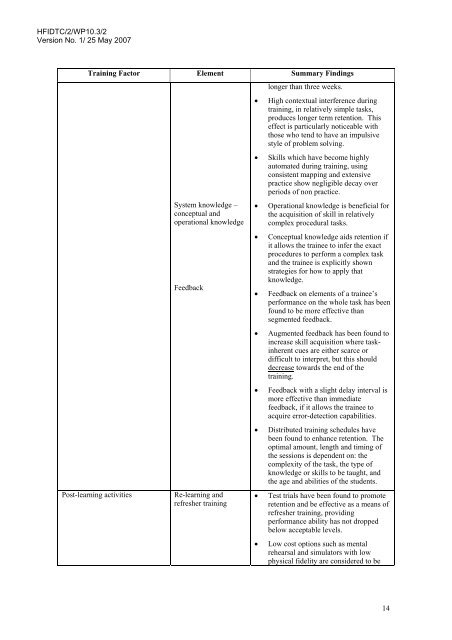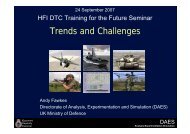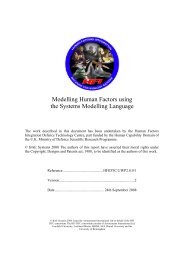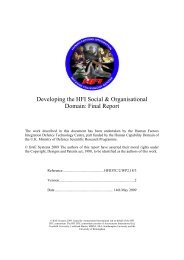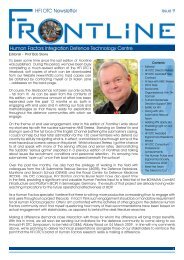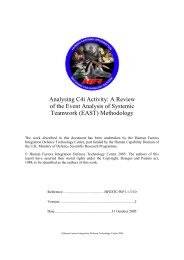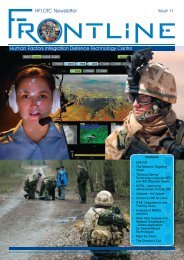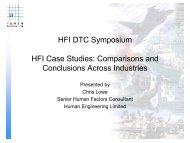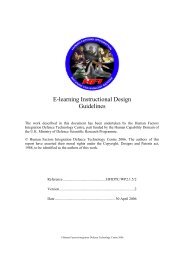Literature Review on Skill Fade - Human Factors Integration ...
Literature Review on Skill Fade - Human Factors Integration ...
Literature Review on Skill Fade - Human Factors Integration ...
Create successful ePaper yourself
Turn your PDF publications into a flip-book with our unique Google optimized e-Paper software.
HFIDTC/2/WP10.3/2<br />
Versi<strong>on</strong> No. 1/ 25 May 2007<br />
Training Factor Element Summary Findings<br />
Post-learning activities<br />
System knowledge –<br />
c<strong>on</strong>ceptual and<br />
operati<strong>on</strong>al knowledge<br />
Feedback<br />
Re-learning and<br />
refresher training<br />
l<strong>on</strong>ger than three weeks.<br />
• High c<strong>on</strong>textual interference during<br />
training, in relatively simple tasks,<br />
produces l<strong>on</strong>ger term retenti<strong>on</strong>. This<br />
effect is particularly noticeable with<br />
those who tend to have an impulsive<br />
style of problem solving.<br />
• <strong>Skill</strong>s which have become highly<br />
automated during training, using<br />
c<strong>on</strong>sistent mapping and extensive<br />
practice show negligible decay over<br />
periods of n<strong>on</strong> practice.<br />
• Operati<strong>on</strong>al knowledge is beneficial for<br />
the acquisiti<strong>on</strong> of skill in relatively<br />
complex procedural tasks.<br />
• C<strong>on</strong>ceptual knowledge aids retenti<strong>on</strong> if<br />
it allows the trainee to infer the exact<br />
procedures to perform a complex task<br />
and the trainee is explicitly shown<br />
strategies for how to apply that<br />
knowledge.<br />
• Feedback <strong>on</strong> elements of a trainee’s<br />
performance <strong>on</strong> the whole task has been<br />
found to be more effective than<br />
segmented feedback.<br />
• Augmented feedback has been found to<br />
increase skill acquisiti<strong>on</strong> where taskinherent<br />
cues are either scarce or<br />
difficult to interpret, but this should<br />
decrease towards the end of the<br />
training.<br />
• Feedback with a slight delay interval is<br />
more effective than immediate<br />
feedback, if it allows the trainee to<br />
acquire error-detecti<strong>on</strong> capabilities.<br />
• Distributed training schedules have<br />
been found to enhance retenti<strong>on</strong>. The<br />
optimal amount, length and timing of<br />
the sessi<strong>on</strong>s is dependent <strong>on</strong>: the<br />
complexity of the task, the type of<br />
knowledge or skills to be taught, and<br />
the age and abilities of the students.<br />
• Test trials have been found to promote<br />
retenti<strong>on</strong> and be effective as a means of<br />
refresher training, providing<br />
performance ability has not dropped<br />
below acceptable levels.<br />
• Low cost opti<strong>on</strong>s such as mental<br />
rehearsal and simulators with low<br />
physical fidelity are c<strong>on</strong>sidered to be<br />
14


